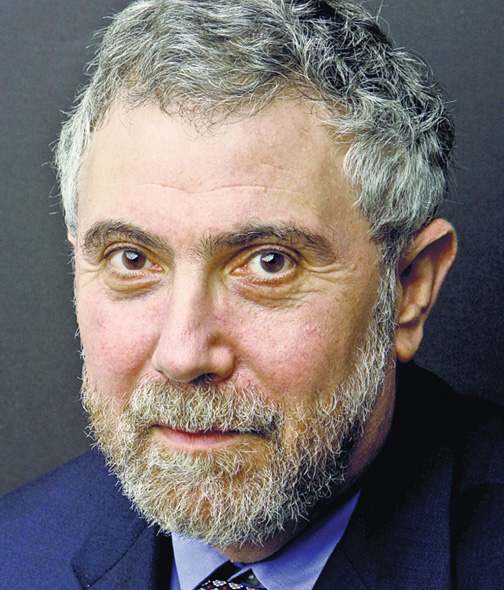In a new book, End This Depression Now! Woodrow Wilson School professor Paul Krugman criticizes his former faculty colleague, Federal Reserve chairman Ben Bernanke, for not reacting aggressively enough to the economic recession. Krugman, a Nobel laureate in economics and a popular columnist, discussed the Fed and the international economic crisis.
Do you communicate with Chairman Bernanke?
No. I think that’s by mutual agreement. I’m a pretty hot commodity politically; I can understand that he doesn’t want to be seen consulting me.
The Fed is supposed to be insulated politically, but it has been the target of some sharp criticism lately. Do you think that has affected Bernanke’s policies?
He says not, but then he would have to say that, right? I’m sure that it plays a role, whether that is conscious or not. I like to think that I am doing him a favor by providing some fire from the other side. It’s necessary for people to say that creating maximum employment is part of the Fed’s job and there are things it could do. That’s the role I’ve been playing.
You urge the Fed to raise its inflation target from 2 percent to 4 percent in order to stimulate the economy. Isn’t that playing with fire?
No. The Fed can always tighten the money supply. If you ask, when did inflation get out of control in the past, it was because the Fed was not vigilant and failed to act when inflation was clearly rising too much. ... Big inflations happen because you have a politicized central bank that either is trying too hard to boost a particular government or is simply trying to finance the government’s budget. We’re not talking about either of those situations here.
Do you see any cause for optimism in the economy?
I see some good things in the U.S. economy, but we are still a very long way from being anywhere close to a real recovery. Beyond that, though, the situation in Europe is approaching some kind of breakdown. They have pursued a failed strategy of austerity, yet they’re not willing to reconsider it, so something awesome and unpleasant seems ready to happen there.
— Interview conducted and condensed by Mark F. Bernstein ’83
More from PAW’s conversation with Paul Krugman
Was Nicolas Sarkozy’s defeat in the recent French elections a defeat for austerity or a defeat for incumbents?
I think it was basically a defeat for incumbents, but incumbents are unpopular because austerity isn’t working. I don’t think you will find too much of an ideological trend, though. We had a left-of-center government booted out in Spain not too long ago and now a right-of-center government booted out in France. But the new Spanish government has quickly become as unpopular as the old one because its austerity policy isn’t working.
On Jan. 1, 2013, the Bush tax cuts expire and sharp spending cuts take effect, a confluence of events that some have dubbed Taxmageddon. How concerned are you?
In the current economic climate, spending cuts are much more damaging than tax increases. But still, this is probably not the time you’d like to raise taxes. The trouble is, there are other considerations beyond pure short-term economics. The Republicans have adopted a strategy of blackmail, of saying give us what we want or the economy gets it in the head. At some point you have to call their bluff.
Ideally, no. It’s probably a good idea to have some tax breaks along with additional spending while the economy is depressed, but the Bush tax cuts were not designed in any rational fashion. They were an attempt to wrap a big tax break for the wealthy in some deceptive sweeteners for the middle class. Given the current political realities, I’d be willing to see the lower-end Bush tax cuts extended for a while at least, but not all of them. At this point, I think you have to say that if the price of getting Republicans to accept an extension of the middle-class tax cuts is to make those high-end tax cuts permanent, no go. Let them all expire, and on their head be it if it hurts the economy.
Can the euro be saved, and should it be saved?
Can it be saved? Economically, yes. I think we need a higher inflation target in the U.S., but they really need a higher inflation target, because they don’t have the other adjustment options we have. They don’t have a unified, Europe-wide budget or labor mobility, and they need some lubrication of their system. It’s a lot easier to make the kinds of adjustments they need with an underlying inflation rate of 3 or 4 percent rather than with one of 1.5 percent, which apparently is what the markets expect over the next five years. So they can save the euro if they are willing to adopt some combination of moderately inflationary policies and provision of emergency lending where necessary.
Should the euro be saved? I do think it was a mistake. If I could go back in a time machine and confront the people signing the Maastricht Treaty back in 1992, I’d say, don’t do this, you really don’t have the necessary preconditions for a unified currency! But going backward on it has its own costs. It would be hugely disruptive economically. It would create a legal morass. If someone owes a debt in euros and the euro has broken up into constituent currencies, what is that debt denominated in? Politically, too, the goal of an integrated, peaceful, democratic Europe is a terribly important thing – not just for Europe, but for the world. To have this fail abjectly would pretty much put an end to that project. I don’t want to see that, and I don’t think anyone else does, either. I would save the euro if we can, but that mostly depends on whether the European Central Bank and the government of Germany accept that their rigid morality-play version of economics is just not workable.













1 Response
Anonymous
10 Years AgoBUZZ BOX: Krugman’s views spark debate over economy
The “PAW Asks” article (Campus Notebook, June 6) with Professor Paul Krugman, about
the U.S. and global economies, prompted more than a dozen alumni responses at PAW Online.
“Professor Krugman has lots of book learnin’, but doesn’t have a clue as to how real businessmen in the real world think,” wrote GAETANO P. CIPRIANO ’78.
DOUG BARTON ’65 found Krugman’s analysis “brilliant, as usual, while still accessible to those of us who got no farther than Econ 102.”
EDWIN L. BROWN *61 said he was in Athens “to implement the 1953 Refugee Relief Act in Truman Doctrine/Marshall Plan days. If now Krugman stands by as odd-man Greece goes under the bus, not seeing the domino effect on Spain, we help bring the House of Europe down on our heads.”
“Keynesian stimulus (more debt) just leads to a compound-interest catastrophe,” commented LARRY DICKSON *71. His suggestion: “Print ‘equity money’ that buys ‘preferred stock’ in national assets, and pay down all the debt.”
Said JOE FOX ’44 *47: “You can’t say Keynesian economics won’t work if you don’t give them a try.”